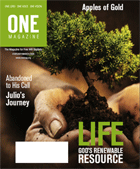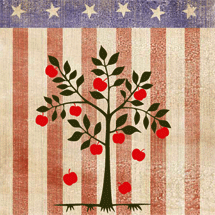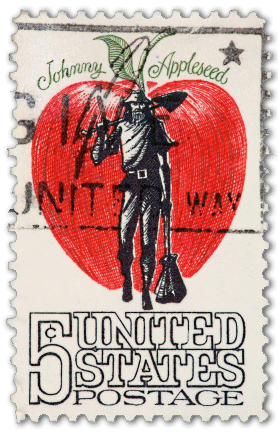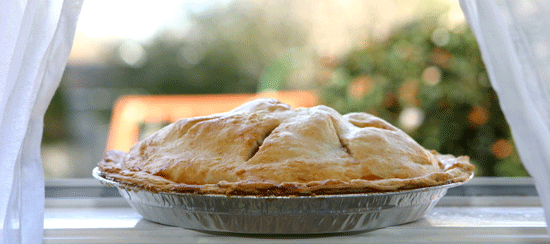
Life: God's Renewable resource
|
 |
apples of gold
The Remarkable Legacy of John Chapman
by David Brown
Find out more about the benefits of planned giving at www.fwbgifts.org or contact the Free Will Baptist Foundation at (877) 336-7575.
|
WHEN THE UNITED STATES CONGRESS BEGAN to issue land grants to Revolutionary War veterans in the early 1800s, settlers flocked to the Northwest Territories of Ohio, Indiana, Michigan, and Illinois. As part of the grant, each settler had to agree to plant 50 apple trees during the first year. Entrepreneur John Chapman went ahead of this migration and bought many tracts of land on which to plant apple orchards. As new settlers arrived, he sold saplings to the pioneers.
John would plant an orchard, build a fence to keep out livestock, then leave the care of the orchard to a trustworthy pioneer who shared in the profits. John would move to another location and start again. His method was similar to a modern day franchise.
One might wonder why the government required settlers to plant apple trees. Was it one of the first examples of a special interest group? Did John lobby Washington? No, Congress knew life on the frontier was hard. Food was scarce, and they were convinced that apple trees would ultimately benefit everyone as a continuous and renewable source of food.
When Americans migrated northwest into Oregon and Washington, many of them took saplings with them. The great orchards of the modern Northwest are descendants of John’s trees. I eat an apple with breakfast each morning thanks—at least in some part—to John Chapman, better known by his nickname, Johnny Appleseed.
Save the Trees
Moses had something to say about fruit trees in Deuteronomy 20: 19, 20. He instructed the Israelites not to cut down fruit trees when they conquered the Promised Land. We still find relevant applications in Moses’ words.
In a broad sense, we can ask ourselves if we are being good stewards of the environment. While I am not sure whether global warming is fact or fiction, one thing is certain. We have a biblical mandate to take good care of the earth. We should be reluctant to use resources that are not renewable. Perhaps we should ride a bike to work once a week to help improve the air quality, reduce the amount of oil we are using, and perhaps even improve our health.
However, Moses’ words apply to our bodies as well. We are a “renewable resource” to the Kingdom of God. We should take care of ourselves so we can serve God for many years.
 Some time ago, I participated in a tour of the Natchez Trace in Southern Tennessee. I learned a lot about my body during that tour. While I had ridden for long distances before, I had never ridden a long distance for three days in a row. I did not have the luxury of taking a day to recover as I traveled 206 miles in three days. During the ride I learned that full speed is not an option. I backed off to about 80% of maximum effort. Some time ago, I participated in a tour of the Natchez Trace in Southern Tennessee. I learned a lot about my body during that tour. While I had ridden for long distances before, I had never ridden a long distance for three days in a row. I did not have the luxury of taking a day to recover as I traveled 206 miles in three days. During the ride I learned that full speed is not an option. I backed off to about 80% of maximum effort.
Nutrition and hydration are very important so I ate lots of fruits and grains and drank water and energy drinks all day. Each night, I slept more than eight hours. The results spoke for themselves. I finished the tour strong, riding 86 miles the first day, 62 the second day and 58 on the last day.
The lessons I learned along the way apply to us all. We simply can’t go full speed every day. None of us run a mechanical engine at full speed all the time. Why do we expect it from our lives? Yes, the work of the Kingdom is urgent but it is better to pace ourselves for the long haul. Our lives are more like a marathon than a sprint.
Nutrition is important, both spiritually and physically. We must guard what and how much we put into our mouths, but also into the brain, spirit, and soul. The Bible is the best food and suggests the following “nutrients” in Philippians 4:8. “Whatsoever things are true, honest, just, pure, lovely, and of good report. We should think on these things.”
We need plenty of rest, exercise, and breaks from stress. Spiritual rest comes through prayer when we let go of our burdens and give them to God. As Vernon Whaley wrote, “Cast your care on the Lord, because he cares about you.”
Providing for Future Generations
We also find a financial application to Moses’ command to spare the trees. Obviously, the fruit could be used for food. When a fruit tree is cut down, it no longer produces fruit. In similar fashion, when we die we will make no further contributions to God’s Kingdom unless we prepare our assets to continue producing financial fruit.
This can be done through planed giving. Planned gifts generate a partial tax deduction, provide income for your lifetime, and yet at your death are converted to an endowment that produces perpetual income for ministries. You can also endow a particular ministry by making a bequest from your will that produces income after your death.
The concept also applies to the ministries that receive estate gifts. We must be wise. When someone dies and leaves their estate to our ministry, it is obvious that the ministry meant a lot to them. We also need to realize that their bequest is the last gift we will ever receive from them. It is not wise to spend monies received from bequests for current expenditures. Instead, these gifts should be diverted to endowment funds, providing perpetual income and serving as a constant reminder of the generous donors. By handling funds carefully, we allow these individuals to produce financial fruit long after they are gone.
Johnny Appleseed had a great business model. Unfortunately his record keeping was somewhat haphazard, and his generosity often led him to give trees to those who could not afford them. Others took advantage of his generosity, purchasing trees on credit that was never repaid. Others bartered with him, exchanging clothing or food for trees.
As a result, John Chapman never owned a cabin, horse, or wagon. He carried all of his possessions on his person, and his bartered clothes did not fit well. He spent most of his life with bare feet, even in winter.
Despite his poor record keeping, when Chapman died in 1845, he was a wealthy man. He owned 1,200 acres of apple orchards worth over $1 million even then. His estate would have been much larger if he had simply recorded the deeds to his property. He left everything to his sister, but taxes and litigationconsumed nearly the entire estate.
As I consider the life of Johnny Appleseed, my thoughts wander. His estate spread across a region with a high concentration of Free Will Baptists. I wish there had been a Free Will Baptist Foundation to suggest he put the proceeds of his apple orchards in a gift annuity that paid income to his sister after his death. He would have avoided all estate taxes, and perhaps the lawyers back then would not have been as willing to sue a ministry because of poor record keeping. The proceeds from his estate would be exponentially larger today, still producing income for ministries around the world.
Today, there are numerous memorials to Johnny Appleseed across the Midwest, even a Disney cartoon about his life. But the statues, songs, and movies are not his legacy. His legacy is the apple I ate for breakfast this morning. Let’s make sure we don’t cut down the fruit trees. Take care of yourself, keep good records, and make plans to support the ministries you love long after you are gone.
David Brown is the director of the Free Will Baptist Foundation. He and his family live in Nashville, TN. To learn more about planned giving and the work of the Foundation, visit their website: www.fwbgifts.org.

Granny Mac’s Easy Apple Pie
Ingredients:
-
6 cups sliced apples
-
1 cup sugar
-
1 teaspoon cinnamon
-
2 tablespoons flour
-
1 tablespoon lemon juice
-
1 tablespoon butter
Mix sugar, cinnamon, and flour together; put over apples and toss till apples are coated. Put in 9-inch pie shell. Sprinkle lemon juice over the apples. Put butter over the top of the apples in small chunks. Put top crust on and seal with a fork around the edges. Cut four small slits in the crust. Bake at 375º for 50-60 minutes until the pie is golden brown.
Lois McPherson is well-known to her family and friends as a great cook! She lives in Sterling Heights, MI.
|
|

